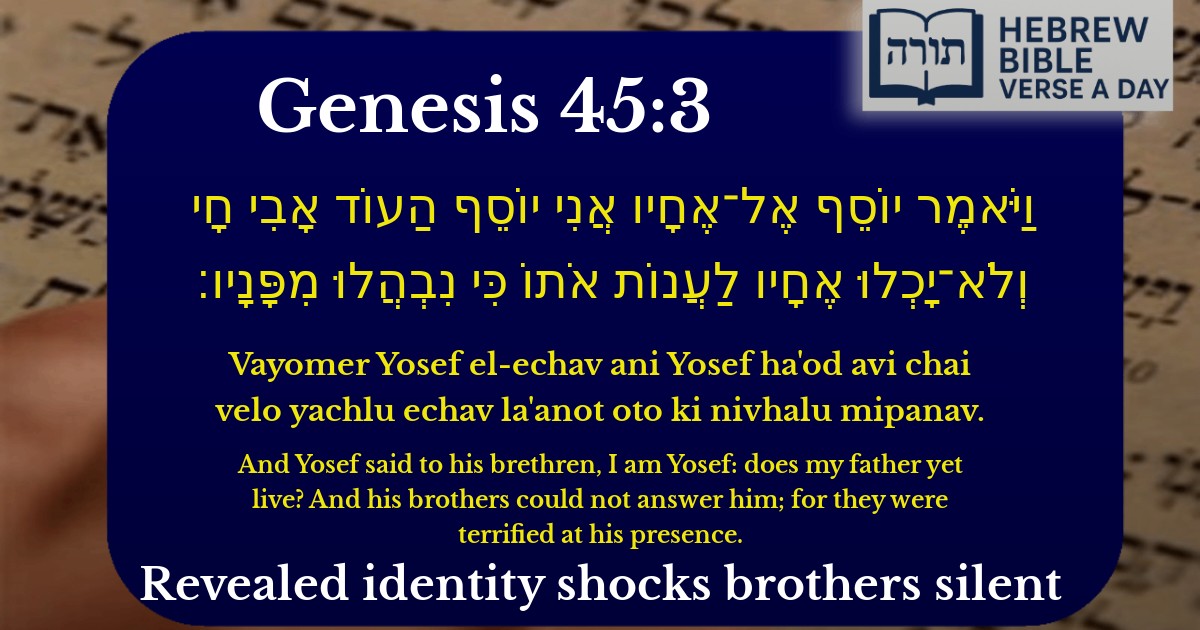Join Our Newsletter To Be Informed When New Videos Are Posted
Join the thousands of fellow Studends who rely on our videos to learn how to read the bible in Hebrew for free!
Hebrew Text
וַיֹּאמֶר יוֹסֵף אֶל־אֶחָיו אֲנִי יוֹסֵף הַעוֹד אָבִי חָי וְלֹא־יָכְלוּ אֶחָיו לַעֲנוֹת אֹתוֹ כִּי נִבְהֲלוּ מִפָּנָיו׃
English Translation
And Yosef said to his brethren, I am Yosef: does my father yet live? And his brothers could not answer him; for they were terrified at his presence.
Transliteration
Vayomer Yosef el-echav ani Yosef ha'od avi chai velo yachlu echav la'anot oto ki nivhalu mipanav.
Hebrew Leining Text
וַיֹּ֨אמֶר יוֹסֵ֤ף אֶל־אֶחָיו֙ אֲנִ֣י יוֹסֵ֔ף הַע֥וֹד אָבִ֖י חָ֑י וְלֹֽא־יָכְל֤וּ אֶחָיו֙ לַעֲנ֣וֹת אֹת֔וֹ כִּ֥י נִבְהֲל֖וּ מִפָּנָֽיו׃
וַיֹּ֨אמֶר יוֹסֵ֤ף אֶל־אֶחָיו֙ אֲנִ֣י יוֹסֵ֔ף הַע֥וֹד אָבִ֖י חָ֑י וְלֹֽא־יָכְל֤וּ אֶחָיו֙ לַעֲנ֣וֹת אֹת֔וֹ כִּ֥י נִבְהֲל֖וּ מִפָּנָֽיו׃
🎵 Listen to leining
Parasha Commentary
📚 Talmud Citations
This verse is quoted in the Talmud.
📖 Chagigah 4b
The verse is cited in a discussion about the emotional impact of divine revelation, comparing it to the brothers' reaction to Yosef's revelation.
📖 Megillah 16b
The verse is referenced in the context of discussing the dramatic moments in biblical narratives and their emotional weight.


The Revelation of Yosef
The verse (Bereishit 45:3) describes the dramatic moment when Yosef reveals his identity to his brothers after years of separation. Rashi explains that Yosef's declaration, "I am Yosef", was not merely an identification but a profound moral rebuke. By asking, "Does my father yet live?", Yosef was reminding them of their earlier deception when they presented his torn coat to Yaakov, causing their father immense grief. The brothers were struck with terror ("nibhalu mipanav") because they realized the gravity of their sin and Yosef's righteousness in not seeking revenge.
The Brothers' Silence
The Midrash (Bereishit Rabbah 93:10) elaborates on why the brothers could not respond: their shame and fear paralyzed them. The Ramban adds that Yosef's sudden revelation—from a powerful Egyptian viceroy to their long-lost brother—left them stunned, unable to process the enormity of the situation. The Talmud (Chagigah 4b) draws a parallel to the future Day of Judgment, when every person will stand in awe before the Divine presence, just as the brothers stood speechless before Yosef.
Yosef's Intentions
According to the Sforno, Yosef's question about Yaakov was not a literal inquiry (since he already knew his father was alive) but a gentle reproach: "How could you have caused our father such pain?" The Kli Yakar emphasizes that Yosef's primary concern was reconciliation, not condemnation. His revelation was meant to lead to teshuvah (repentance) and familial healing, as seen in the subsequent verses where he comforts his brothers.
Lessons from the Verse